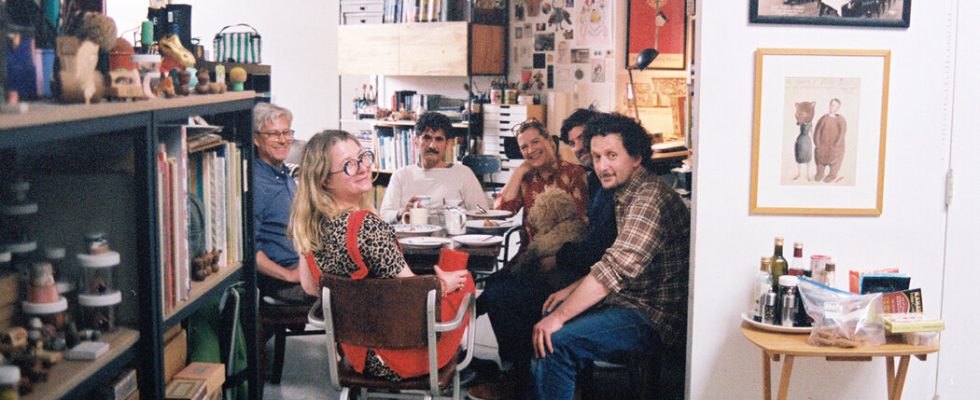When Doug Salati won a Caldecott Medal this year for his children’s book “Hot Dog,” the five authors and illustrators with whom he shares a Brooklyn studio space were thrilled for him — and they could also relate to his success.
Brian Floca won a Caldecott for “Locomotive” (2014). Sophie Blackall has been awarded the medal twice, for “Hello Lighthouse” (2019) and “Finding Winnie” (2016). Rowboat Watkins received an Ezra Jack Keats Award for “Rude Cakes” (2016). Johnny Marciano is the best-selling author and illustrator of “Madeline at the White House” and the co-author of the “Klawde” series. Dasha Tolstikova won an award from the American Library Association for illustrating “Nine Open Arms” (2015).
These six children’s book creators work out of an open loft in Gowanus, with tall windows and brick walls painted white. They say they get much more from their studio than just a quiet place to work.
As a group, they feed off one another professionally as well as creatively, exchanging advice on how to make a living in the industry, and giving feedback on sketches and story lines. They share reference books and photos to help them draw dinosaurs or fire trucks. They eat lunch together around a communal table in the center of the room, and have become friends.
“It’s that very simple model,” Salati said, whispering to avoid disturbing his studio mates. “Surround yourself with the best people you can, and rise to the occasion.”
Salati and Watkins sometimes chat between the bookshelf and the feathery plant that separate their work spaces. Some of their conversations — not exclusively held through the furniture — helped shape “Hot Dog,” about a dachshund and its owner who escape a sticky, crowded New York City on a summer day and go to the beach.
In an earlier version, Salati said, Hot Dog ran away, but Watkins questioned the plot twist. “What kind of dog does that?” Salati remembered him saying. That conversation helped Salati make the book more about the relationship between Hot Dog and his person, a lady with a floppy hat and big glasses, rather than just about the dachshund himself.
“‘Hot Dog’ was a better book because of all of these people,” Salati said. “For sure.”
Blackall, who has written or illustrated more than 50 children’s books — including the “Ivy and Bean” series (written by Annie Barrows) and “The Witches of Benevento” series, co-created with Marciano — is revered by her studio mates for her productivity. Tolstikova noted that Blackall is able to accomplish so much while also getting a reasonable amount of sleep.
Watkins says Blackall “knows how to start” a project: “There’s no weird, pointless deliberation.”
Once she’s begun, Salati said, “She doesn’t belabor things.” From her he says he’s learned: “Do the best job you can do in the circumstances you have, in the time you have, and then move forward.”
The original group of illustrators moved into the space in 2011, and over the years, a few have come and gone as they’ve moved out of the city or spent more time on other endeavors. The studio mates like to joke that the cast keeps changing — there was Season 1, Season 2, Season 3 and so on — and the room is often reconfigured when someone leaves or joins, work spaces expanding or contracting as needed.
Among the original inhabitants, three remain: Blackall, Floca and Marciano, who left for a time and then came back, taking a new perch at a small desk by a window.
In between the more talkative hours, in the morning and at lunch, the studio falls mostly quiet, its soundtrack just the hum of a window air-conditioner, the scratch of pencils, the tap-tap of computer keyboards, the splash of a paintbrush being cleaned in a jar of water.
And sometimes, there is a hair dryer. Floca uses a Conair 1875 to help his watercolors set faster, a trick he said he learned from one of the studio’s early tenants, Sergio Ruzzier, an illustrator whose books include “One Mean Ant.”
“There’s a lot of reading of manuscripts, there’s a lot of looking over stuff,” Marciano said, sitting at the communal table with the others.
“That’s a huge, huge benefit,” Salati added. “To get somebody’s eyes on something, who’s not your editor or your agent.”
“But whose taste you trust,” Tolstikova said.
“But whose taste you trust,” Salati echoed.

